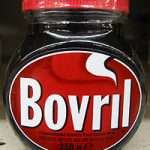Attending functions at the same hotel twice in the past two weeks, its consistency was notable – the service was abysmally slow on both occasions. There was not even an opportunity to pass comment, it would have been forgotten by the time the next course had arrived.
Comment at a hotel on a visit to Austria had only worsened things. The hotel served soup as its second course each evening. For three evenings in a row, beef consommé with various additions provided one of the soup options. Muttering ‘Ah, another mug of Bovril’, did not contribute to a fraught relationship with a waitress who by the end of the week was loathe even to hand me a menu.
Perhaps she stood in the ranks of those who dislike Bovril, a bit like those who dislike Marmite.
Being honest, I have no recall of ever drinking a mug of Bovril, but it has acquired mythological status in my consciousness. Its associations are standing on the concrete terraces of miscellaneous football grounds around England; it brings the warmth of the camaraderie and laughter of those occasions; it spells the ease of Saturday afternoons with nothing needing to be done on Sundays. It goes with the smells of beery breath and sweat and the sounds of banter. It goes with the bone chilling coldness of damp English winter days.
Are there still places that serve mugs of Bovril and meat pies?
It is so long since I attended a football match in England that Bovril may by now be as archaic as jellied eels and pie and mash shops. No matter; it is the symbol that matters more than the substance.
Perhaps the working class world of Bovril and meat pies was never a secure environment; perhaps the men who stood around on the terraces had as many anxieties and fears as their counterparts in a new century who stand watching matches on a big screen in the local pub, but maybe there was a solidarity in those times that has disappeared in a fragmented society.
‘Another mug of Bovril’ was not really pejorative. It was meant as a sotto voce compliment that a bowl of soup could evoke happy thoughts, feelings of well-being and stability and security. It was evocative of an age when anything seemed possible; well, at least, anything seemed possible at the beginning of the match.
Perhaps things only become symbols in retrospect, perhaps it is only in looking backwards that we project onto objects or experiences meanings and associations that they never carried at the time; perhaps, thirty years ago, the idea that a mug of Bovril would attain some symbolic status would have been laughable.
The hotel yesterday did not even rise to anything symbolic, but should I be granted another thirty years, I wonder what the symbols of security will be. Is security something one can only feel when one is young? Once gone, gone forever?
